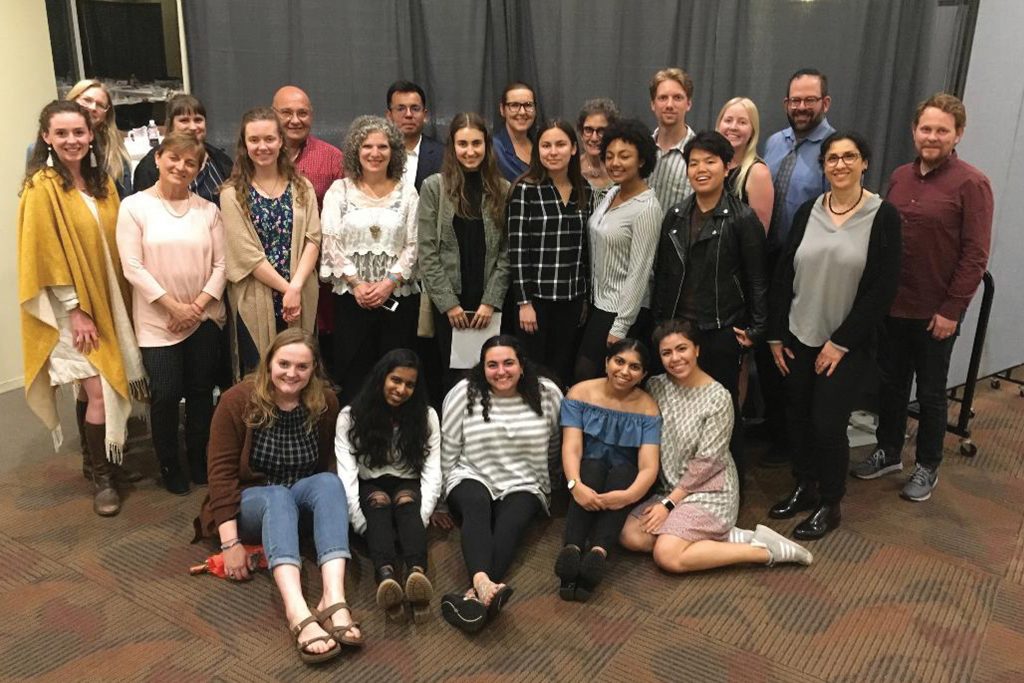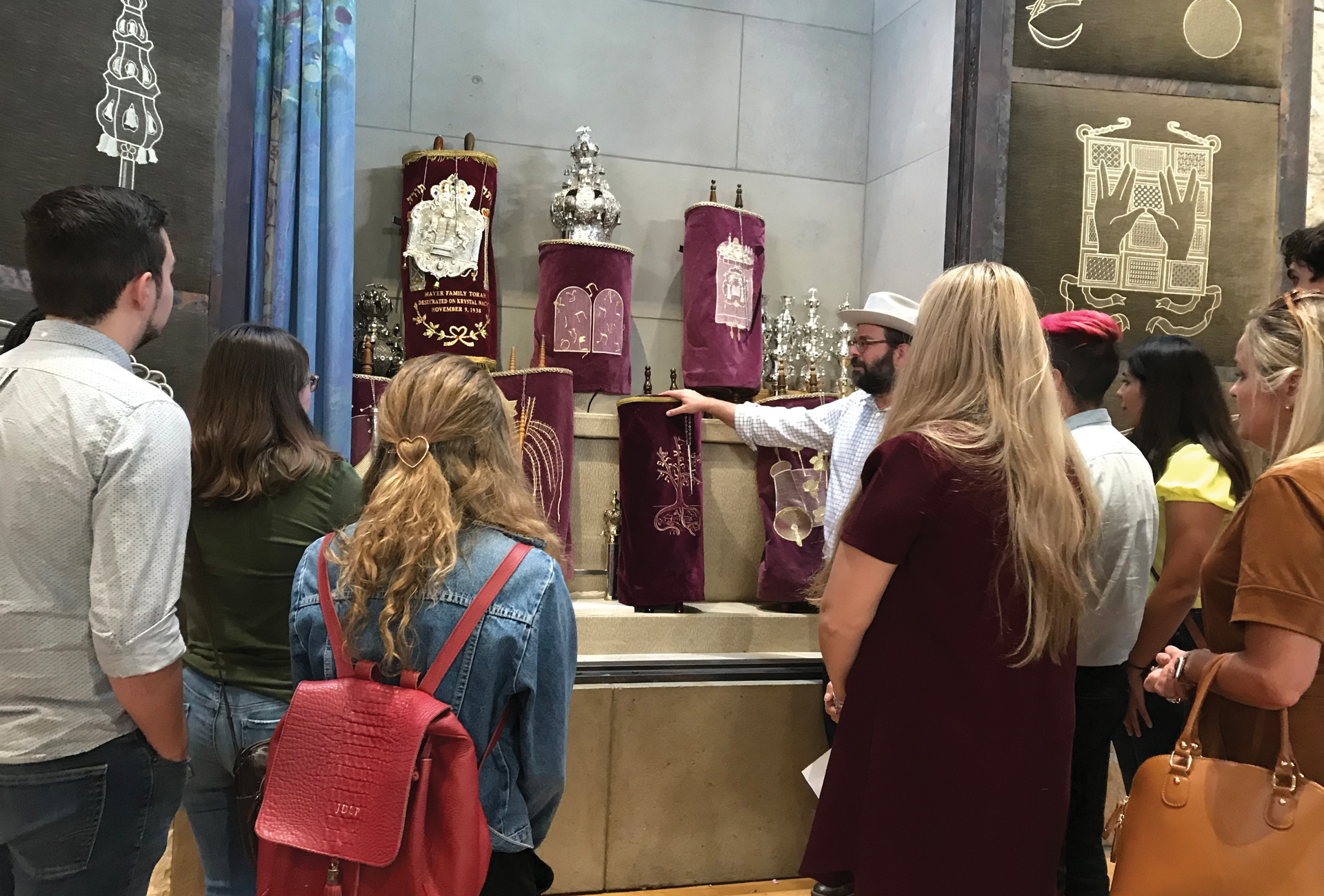There’s an intangible drive that keeps us going when things seem hopeless, even after giving it our all. It’s this “moral fuel,” a term coined by UT Austin student Allison Essington, that stands at the heart of a fledgling internship program from the Schusterman Center for Jewish Studies.
During one of the program’s weekly classes, guest speaker Del Garcia, director of international projects at the Migrant Clinican’s Network, told students about her struggles with “moral injury” in her work — the pain caused by recognizing that, despite our best efforts, there are times when we are unsuccessful in achieving what is necessary for those who need it most. Essington asked Garcia about its inverse — what she called moral fuel.
“The simple but profound concept of ‘moral fuel’ became a touchstone for all of us throughout the rest of the semester as we discussed both the difficulty of the work that we were all doing in the social justice arena and the things that compel us forward and give us energy,” says Suzanne Seriff, director of the Internship Program in Jewish Studies and senior lecturer in anthropology and Jewish studies.
In class, students are invited to consider social justice issues such as health care, poverty and hate speech through the lens of Jewish teachings, such as tzedakah (giving) and tikkun olam (repair of the world).
“The sweet spot of this program — unique among Jewish studies internship programs throughout the country — is the trifecta of the internship experience (10 hours per week), Jewish textual study and personal experience from community leaders like Del Garcia in the nonprofit sector who join our class each week and help us focus on broad social justice issues through a personal lens,” Seriff says.
The internship program is open to liberal arts students of all faiths and majors, so the first two weeks of class serve as an introduction on how to study Jewish texts and the fundamentals of Jewish law and tradition, taught by a local rabbi, Neil Blumofe. During the program’s inaugural semester in spring 2019, with just nine students, the religions represented included Islam, Buddhism, Protestantism, Catholicism and Judaism. This fall, the class again has nine students, who have a mix of distinct faith traditions.
“Even though these numbers may seem small, the program is purposefully capped at 15 per semester in order to maximize the personal attention and internship opportunities for each student,” Seriff says.

The types of internships students take vary depending on individual interests. Internships in this program have involved a wide range of local organizations that do everything from teaching classical guitar to underserved populations, to coordinating health services for migrants, to recording the oral histories of those affected by structural violence in Texas. And because not all internships are paid, the Schusterman Center provides some scholarship support to ensure that people of all backgrounds are able to participate.
“My internship has allowed me the opportunity to work directly with the homeless population —therefore, from the moment I began my internship, my opinion of homelessness rapidly began changing,” says Essington, a Human Dimensions of Organizations sophomore who interned at Art from the Streets. “I soon was able to understand the complex similarities that I shared with all of the artists — we are all human. This may seem like a very obvious aspect, yet it is one that I find too frequently forgotten.”
To have so many people from so many backgrounds talk about their struggles and triumphs — their beliefs and their passions — ignites a fire in you like no other.
Savannah Anderson-Knight
The culmination of the spring semester was a Passover Seder service at Austin synagogue Agudas Achim led by Rabbi Blumofe and attended by the students, their internship supervisors and the guest speakers from throughout the semester. Students shared a short statement about their internship experience that related to the Passover topics of liberation, enslavement or quests for freedom and justice. The rabbi wove their stories into the service as they shared a four-course meal of matzoh ball soup, salad, baked chicken and vegetables, and a variety of desserts, including the favorite — chocolate-covered matzoh.
“Perhaps the most valuable part of this class was the community it built, and this was beautifully shown at our Seder,” says Savannah Anderson-Knight, a government and anthropology junior who interned at the Texas After Violence Project. “Hearing how touched everyone was by the class and seeing how a room of social justice leaders interacted with one another was uplifting, and a great way to start finals season. To have so many people from so many backgrounds talk about their struggles and triumphs — their beliefs and their passions — ignites a fire in you like no other.”
Passover happens only once a year, but students in the fall participated in a “Sukkah for Social Change” dinner at Agudas Achim during the annual Jewish harvest holiday of Sukkot. One of the festival’s central tenets is welcoming guests, especially the most vulnerable among us.
There is one other notable adjustment in the program’s format for the fall semester. It’s a change that was unanimously recommended by the spring interns: more time together. Seriff has extended the length of the weekly evening classes by 30 minutes to allow more time for discussion and reflection, taking the 90 minute sessions to 2 hours.
“In over 30 years of teaching, that’s a first!” Seriff says. “Students are hungry for a safe place to explore their ethical role and sense of responsibility in the wider world, and this class seems to provide that for them.”
